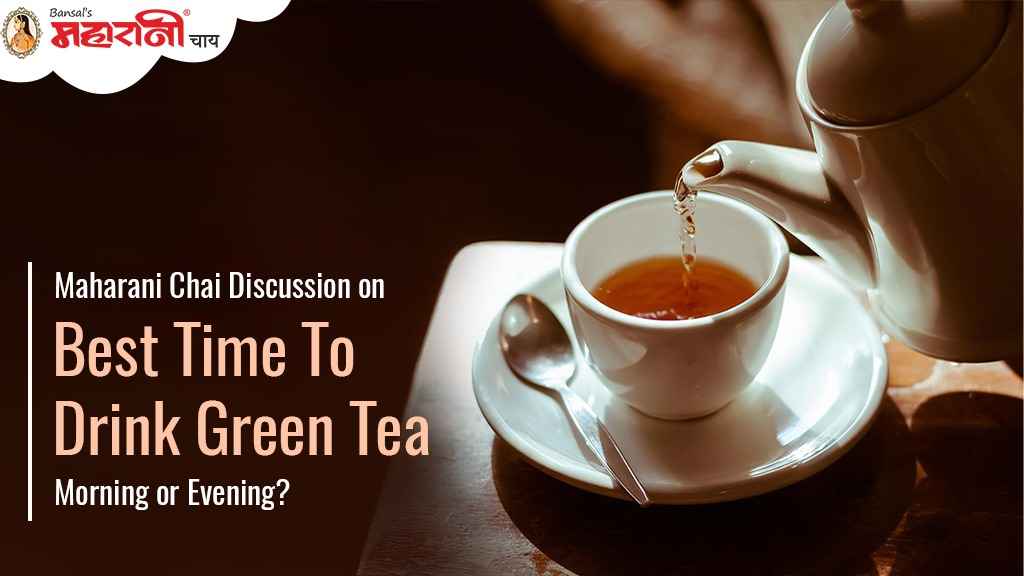Green tea has long been celebrated for its impressive health benefits, from boosting antioxidants to enhancing metabolism and improving mental clarity. A frequent question among tea enthusiasts and health-conscious individuals is: What is the best time to drink green tea—morning, evening, or both? To shed light on this, we’ve brought together expert opinions to guide you in making the most of your green tea routine.
The Case for Morning Green Tea
Starting your day with a cup of green tea can be more than just a soothing ritual—it’s a health-boosting habit that sets the tone for the day ahead. Packed with antioxidants and gentle caffeine, green tea offers a refreshing way to awaken the mind and energize the body. But why does the morning stand out as an ideal time for this brew? Let’s hear from the experts who shed light on the benefits of sipping green tea during the morning hours.
Expert Insights:
- Nutritionist Natasha: Starting your day with green tea provides a gentle energy lift, sharpening focus and jump-starting your metabolism.
- Nutritionist Deepika: Drinking green tea 30 minutes post-breakfast is ideal. It avoids caffeine overload while boosting energy levels.
- The Nutrition Twins: A cup of green tea 90 minutes after waking aligns with your body’s cortisol cycle, offering a balanced intake of antioxidants and polyphenols for sustained energy.
The Case for Evening Green Tea
As the day winds down, many look for ways to relax and rejuvenate. Evening green tea, with its calming properties, can be the perfect companion to unwind after a long day. Thanks to its L-theanine content, green tea promotes relaxation without drowsiness, making it ideal for evenings. But is it always the right choice at this time? Our experts provide their insights to help you decide if green tea fits your evening routine.
Expert Insights:
- Nutritionist Natasha: Green tea’s L-theanine content can promote relaxation when consumed early in the evening. For those sensitive to caffeine, decaffeinated green tea is the way to go.
- Nutritionist Lisa Young: Green tea after dinner supports digestion, but opting for decaffeinated versions ensures that your sleep remains undisturbed.
What Experts Say about Time To Drink Green Tea
When it comes to finding the ideal time to drink green tea, expert advice can be invaluable. Who better to guide us than seasoned nutritionists and wellness specialists who have studied the science and practical benefits of green tea in-depth? In this section, we delve into their perspectives, presenting their insights in their own words. This way, you can appreciate the authenticity and unique viewpoints of each expert, helping you make an informed decision about incorporating green tea into your daily routine. Let’s find out what they say:
1. Nutritionist Natasha Ngindi

Natasha Ngindi, a South African-born Nutritionist based in Toronto, specializes in non-diet nutrition and intuitive eating. With a background in Nutrition Science from the University of Saskatchewan and certification as a Zumba instructor, Natasha is passionate about promoting body acceptance, food freedom, and joyful movement. After overcoming diet culture struggles, she now helps clients embrace self-love and healthy living without weight-loss pressures. Natasha is a vocal advocate for health at every size, sharing her journey and expertise to inspire others. Check The Thick Nutritionist to know more about her work.
Natasha’s advice about the Best Time for Green Tea
When deciding whether to drink green tea after dinner, it’s important to take an intuitive approach, paying attention to how it feels for you personally. While green tea is rich in antioxidants and can boost metabolism, each individual’s response may vary. For those sensitive to caffeine, it’s often best to enjoy green tea earlier in the day. Drinking it in the morning or early afternoon allows you to experience its benefits—such as improved mental clarity, focus, and digestion—without disrupting your sleep. In the morning, green tea provides a gentle energy lift and supports metabolism, thanks to its blend of caffeine and antioxidants. Early afternoon consumption helps sustain energy without the jitters of stronger caffeinated drinks, while early evening consumption can promote relaxation due to the presence of L-theanine. Some may find drinking green tea after dinner calming, but if you’re caffeine-sensitive, it can interfere with sleep. If you enjoy green tea after dinner (but it interrupts your sleep), consider switching to a decaffeinated version for digestive support without disrupting rest. Ultimately, while green tea offers a range of health benefits, the best time to drink it depends on your body’s response and your lifestyle. If it feels right for you after dinner and doesn’t affect your sleep, it’s perfectly fine to enjoy it. The key is listening to your body and adjusting based on how you feel.
2. Nutritionist Deepika
Deepika, a licensed Nutritionist and founder of Live Food Farmacy champions the philosophy of “food as medicine.” She draws from her journey of overcoming nutrient deficiencies through mindful eating and lifestyle changes, which transformed her health and well-being. Deepika emphasizes sustainable, holistic practices that integrate nutrition with mental, emotional, and spiritual health. With a deep passion for guiding others, she helps individuals design aligned and joyful lifestyles, proving the incredible power of nutrition to heal and nourish the body from within.

Deepika’s advice about the Best Time for Green Tea
Green tea is well-known for its many health benefits, from aiding in weight loss to supporting heart health. But is it wise to enjoy a cup after dinner? Let’s dive into this topic and explore the best times to sip this antioxidant-rich beverage for maximum benefit.
Green Tea After Dinner – Yay or Nay?
While green tea is packed with antioxidants, particularly catechins that help reduce inflammation and promote heart health, drinking it after dinner may not be the best idea. One reason is its caffeine content. Although green tea contains less caffeine than coffee, it’s still enough to potentially interfere with your sleep. Research shows that caffeine can disrupt melatonin production, the hormone that regulates sleep (1). If you’re sensitive to caffeine, drinking green tea after dinner might lead to restlessness or difficulty falling asleep, which can impact your overall well-being.
Another factor to consider is the presence of tannins in green tea. Tannins can inhibit the absorption of certain minerals, particularly iron. If your dinner is rich in iron from foods like leafy greens or meat, drinking green tea immediately after your meal may reduce how much iron your body absorbs (2).
When Is the Best Time to Drink Green Tea?
So, when should you enjoy green tea to get the most out of it? Here are a few ideal times:
1. Morning Boost: Drinking green tea about 30 minutes after breakfast can give you an energy lift without the intense caffeine hit of coffee. Studies suggest that green tea’s blend of caffeine and L-theanine improves focus and mental clarity while being gentler on the stomach (3).
2. Mid-Afternoon Energy: Feeling sluggish in the afternoon? A cup of green tea can provide a healthy energy boost. Its catechins also help improve metabolism, making it great for weight management and stabilizing blood sugar (4).
3. Before Exercise: Drinking green tea before your workout can increase fat oxidation and boost endurance. Studies show that green tea helps with fat burning during exercise, especially if consumed 30 minutes prior (5).
For evening tea lovers, I recommend switching to decaffeinated green tea, which still offers many health benefits without interfering with your sleep.
While green tea is incredibly beneficial, it’s best to avoid drinking it immediately after dinner, especially if you’re sensitive to caffeine or want to optimize nutrient absorption. Instead, enjoy your green tea in the morning, mid-afternoon, or before your workout to maximize its positive effects.
3. Nutritionist Lisa R. Young

Dr. Lisa R. Young, Ph.D., R.D.N., C.D.N., is a renowned nutritionist, portion control expert, and adjunct professor at NYU. She is the author of Finally Full, Finally Slim, and The Portion Teller Plan, acclaimed for their evidence-based guidance on weight management. With nearly three decades of private practice experience, Dr. Young specializes in counseling on obesity, disease prevention, and more. She has appeared in major media outlets and influential documentaries. Visit her website Dr Lisa Young to know more about her.
Lisa Young’s Advice about the Best Time for Green Tea
Green tea can be a good choice after dinner, but it depends on your personal needs and preferences. Green tea contains antioxidants like catechins, which can aid digestion and have other health benefits. However, it also contains caffeine, so if you’re sensitive to caffeine or have trouble sleeping, it might not be the best option at night. For a more calming effect, you could opt for decaffeinated green tea or herbal teas like chamomile or peppermint tea, which can aid digestion without affecting sleep.
4. Nutritionists Tammy and Lyssie
Tammy Lakatos Shames and Lyssie Lakatos, also known as the Nutrition Twins®, are nationally recognized registered dietitian nutritionists, personal trainers, and authors. With over 15 years of experience, they specialize in empowering clients to achieve energy, health, and weight goals through approachable, science-backed strategies. Renowned for their engaging style, they have appeared on prominent TV shows like Good Morning America and The Doctors and authored three bestsellers. Passionate about inspiring healthy lifestyles, they are active contributors to top publications and nutrition organizations.

Lyssie and Tammy’s Advice about the Best Time for Green Tea
We don’t recommend drinking green tea after dinner because it contains caffeine, which can get in the way of a good night’s rest. We recommend limiting consumption of tea after 3pm so the caffeine has time to leave the body since caffeine’s half life is typically about 5-6 hours, which means the amount of caffeine that you had is only cut in half about 6 hours later, so it takes a long time to clear the body. The ideal time to drink green tea is from about 90 minutes after waking up (allowing your body to have a natural cortisol response before having caffeine is ideal, that’s why we recommend waiting 90 minutes) until about 3pm. If you can get 4-5 tea cups (a tea cup is about 4 ounces) in before 3pm without feeling jittery or anxious, the EGCG in green tea can give your metabolism a slight boost while you’ll also flood your body with polyphenols, which are potent antioxidants that fight inflammation.
Green Tea Timing Tips for Different Lifestyles
When it comes to green tea, timing can make all the difference. Depending on your goals—be it weight management, better digestion, or relaxation—choosing the right time can amplify the benefits. Whether you’re an early riser, a fitness enthusiast, or someone who seeks tranquility in the evenings, the following expert tips will guide you in aligning green tea with your lifestyle needs.
Tailored Advice:
- For Weight Management: Morning or mid-afternoon green tea optimizes metabolism, as recommended by Deepika and The Nutrition Twins.
- For Digestive Benefits: An early evening cup aids digestion, per Lisa Young’s insights.
- For Relaxation: Caffeine-sensitive individuals can enjoy decaffeinated green tea in the evening for a calming effect.
Conclusion: Listening to Your Body
Experts unanimously agree that the best time to drink green tea varies based on individual preferences and lifestyle goals. Whether you savor it in the morning for energy or in the evening for relaxation, green tea fits seamlessly into your daily routine. We encourage you to experiment with the timing and share your experiences in the comments.

Maharani Green Tea – Natural 25 Tea Bags
Maharani Chai offers premium green tea blends that are perfect for both morning refreshment and evening relaxation. Discover your favorite blend today and make green tea a part of your wellness journey.

